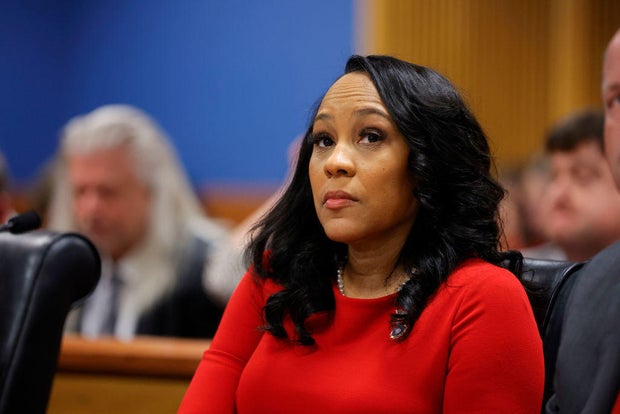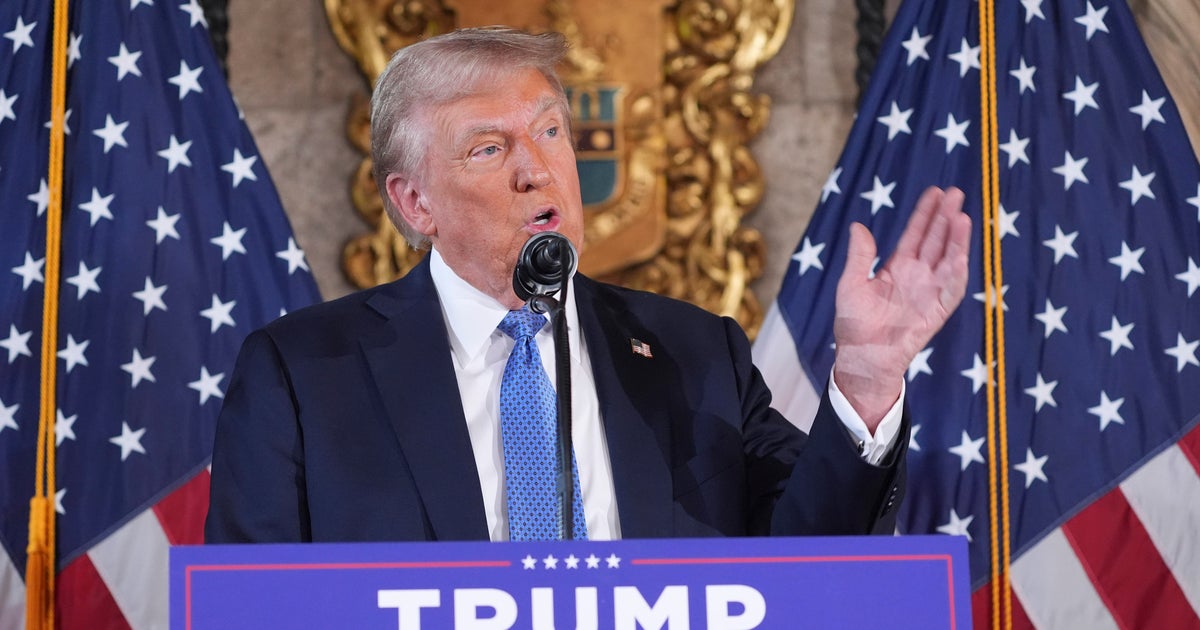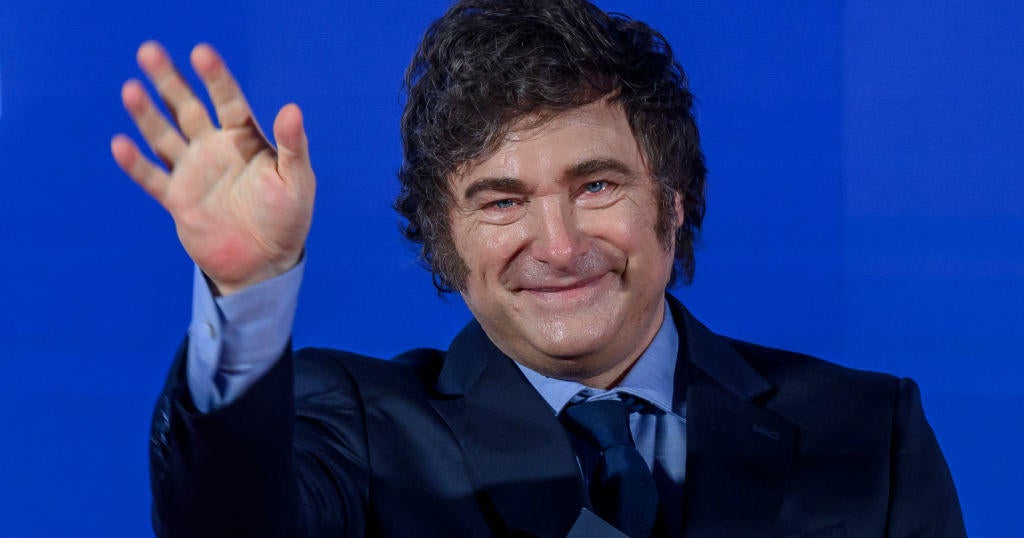Georgia appeals court removes Fani Willis from Trump 2020 election case
Washington — The Georgia Court of Appeals on Thursday ruled that Fulton County District Attorney Fani Willis must be removed from the 2020 election case against President-elect Donald Trump, reversing a trial judge's decision that allowed her to remain on the case.
Trump and more than a dozen allies were charged last year by Fulton County prosecutors related to what they said was an alleged scheme to overturn the results of the 2020 election in Georgia. The president-elect pleaded not guilty.
"After carefully considering the trial court's findings in its order, we conclude that it erred by failing to disqualify DA Willis and her office," the court's majority found. "The remedy crafted by the trial court to prevent an ongoing appearance of impropriety did nothing to address the appearance of impropriety that existed at times when DA Willis was exercising her broad pretrial discretion about who to prosecute and what charges to bring.."
The court, which divided 2-1, said that in this case, "disqualification is mandated and no other remedy will suffice to restore public confidence in the integrity of these proceedings." But it did not dismiss the indictment, leaving it in place. The prosecution will likely be referred to a body known as the Prosecuting Attorneys' Council for reassignment.
Judge Trenton Brown wrote for the majority that "while this is the rare case" in which Willis and her office must be removed because of a "significant appearance of impropriety," the record in the case doesn't support the "imposition of the extreme sanction" of tossing out the indictment.
Steven Cheung, spokesman for the president-elect, said in a statement that "in granting President Trump an overwhelming mandate, the American People have demanded an immediate end to the political weaponization of our justice system and a swift dismissal of all the Witch Hunts against him. We look forward to uniting our country as President Trump Makes America Great Again."
Steve Sadow, Trump's lawyer, praised the decision as "well-reasoned and just."
"The court highlighted that Willis' misconduct created an 'odor of mendacity' and an appearance of impropriety that could only be cured by the disqualification of her and her entire office. As the Court rightfully noted, only the remedy of disqualification will suffice to restore public confidence," he said in a statement. "This decision puts an end to a politically motivated persecution of the next president of the United States."
Willis could appeal the decision to the Georgia Supreme Court.
In March, Fulton County Superior Court Judge Scott McAfee declined to disqualify Willis from the case over a romantic relationship she had with Nathan Wade, whom she hired as a special prosecutor in November 2021 to assist in the investigation into Trump and his allies. McAfee had ruled that Willis and the Fulton County District Attorney's Office could remain on the case if Wade stepped aside, which he did.
Trump and eight co-defendants appealed McAfee's ruling. The Georgia Court of Appeals was set to hold a hearing earlier this month, but canceled the proceedings after Trump defeated Vice President Kamala Harris for the presidency in November. He is set to be sworn in for a second term Jan. 20.
Raised by Michael Roman, a longtime GOP operative charged alongside Trump, the bombshell revelation of Willis and Wade's relationship roiled the prosecution and derailed proceedings in the case for months. McAfee held a multi-day evidentiary hearing examining whether Willis had a conflict of interest in the case through her relationship with Wade and travels with him.
Roman had claimed the two started dating before Wade was hired to work on the investigation into Trump's alleged efforts to overturn the results of the 2020 election in Georgia, and alleged that Willis financially benefited from the relationship. Trump and seven others joined Roman's effort to remove Willis and her office from the case and have the charges against them dismissed.
Willis and Wade admitted they were romantically involved but denied any wrongdoing. They testified that the relationship began after Wade was hired, and that it ended last summer.
While McAfee's decision was a win for Willis, it lambasted her for what the judge said was a "tremendous lapse in judgment." He criticized the "unprofessional manner" of her testimony during the evidentiary hearing earlier this year, when Wade and Willis separately answered questions from prosecutors and defense attorneys about their relationship.
The judge said that while he was not able to "conclusively establish" when Wade and Willis' relationship turned romantic, "an odor of mendacity remains."
Ashleigh Merchant, a lawyer for Roman, said they are "pleased" the appeals court agreed with them that Willis shouldn't have been allowed to prosecute the case.
"We regret that Ms. Willis did not do the right thing and voluntarily recuse herself when Mr. Roman raised the issue because failing to do so put Judge McAfee in an untenable position," she said in a statement. "This failure of judgment is the exact reason Mr. Roman was forced to move to disqualify her in the first place, so we are thankful that the court agreed she should not be allowed to prosecute this case any further."
The prosecution in Fulton County was one of four pursued against Trump. He faced charges brought by special counsel Jack Smith in federal courts in Washington, D.C., and South Florida, and was charged with violating New York law by the Manhattan district attorney.
The Fulton County case had moved the slowest, in part because of the allegations against Willis and Wade. Trump was initially charged with 13 felony counts, but five of them were dismissed by McAfee for various reasons. Of the 18 original co-defendants, four pleaded guilty after reaching plea deals with prosecutors.
In New York, Trump was convicted on 34 counts of falsifying business records and was set to be sentenced last month. That sentencing, however, was postponed following his election.
The two federal prosecutions, meanwhile, came to a close last month after Smith sought to dismiss the charges. A longstanding Justice Department policy prohibits the prosecution of a sitting president, and the special counsel said that applied to Trump's situation.
The first case stemmed from his alleged mishandling of sensitive government documents after he left office in January 2021. The second arose from what Smith claimed was an unlawful scheme to subvert the peaceful transfer of presidential power after the 2020 election.
Trump had denied wrongdoing in all of the cases, claiming they were brought by politically motivated prosecutors who sought to harm his campaign for the White House.




